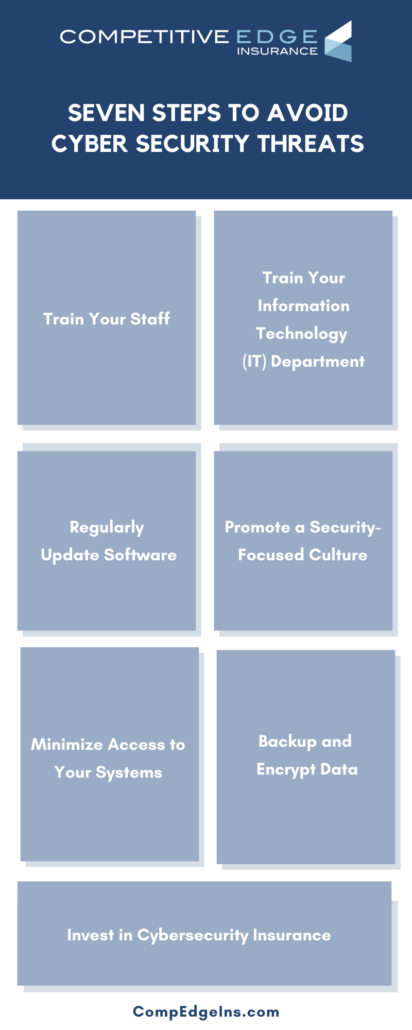Seven Steps to Avoid Cyber Security Threats
Cyber security is more important today than ever before. Many businesses, especially small businesses, are the victims of cyber attacks daily—and the outcome for many is detrimental. In fact, did you know that 60% of small businesses who fall victim to cyber attack close their doors within six months?
The fact of the matter is that cyber threats—whether they be ransomware or phishing—are too grave to ignore the risks. Preparation and prevention are key to keeping your business safe. In this article, we’ll discuss seven steps to avoid cyber security threats.

Train Your Staff
First things first, train your employees. Make the guidelines of your business’s cyber security policy abundantly clear. Apart from training, employees should also be familiarized with and taught how to identify suspicious activity. Lastly, employees should know safe practices for sending and receiving data.
For example, they need to know how not to send excel spreadsheets in an email. Instead, create a zip file or convert the document into a PDF. Why? It is very easy to scrape data from an excel file while in an email.
Train Your IT
Your Information Technology (IT) department should additionally be trained. An IT department, according to Jobs.net, “oversees the installation and maintenance of computer network systems within a company.” They also help businesses maintain their digital infrastructure and provide troubleshooting.
This considered, IT departments need to know what to look for when it comes to cyber security threats.
Regularly Update Software
Firstly, your software should be particularly designed to block ransomware. Secondly, this software should be routinely updated.
To many people’s surprise, cyber attacks often happen when systems and/or software aren’t fully up-to-date, leaving room for weakness. These points of weakness are then exploited by cybercriminals to gain access to your network.
Don’t let it get to this point.
Promote a Security-Focused Culture
Forbes states that “the security culture of an organization is foundational to its ability to protect information, data and employee and customer privacy.”
(“Security culture” being “the ideas, customs and social behaviors of an organization that influence its security”).
According to Maryville University, encouraging a strong security culture within a business might look like:
- Holding regular training sessions for employees to help them recognize external threats
- Teaching employees strategies for minimizing their risk of being hacked
Backup and Encrypt Data
Imagine, your business experiences a cyber attack—and none of your data is backed up. This would result in serious financial loss as well as loss of data, not to mention downtime.
Be sure to back up and encrypt your data instead. We advise you to encrypt:
- Client and customer information
- Employee information
- And all other business data
Minimize Access to Your Systems
When it comes to allowing others access to your data, whether it be passwords, email, or a host of other personal information, some humans can lean a bit too far to the trustworthy side.
Having control over who can access your network is crucial—whether online or in-office. Better safe than sorry!
Invest in Cybersecurity Insurance
Of course, we have to mention the benefit of investing in cyber security insurance.
A cyber liability policy might include:
- Data Breach Coverage
- Business Interpretation Loss Reimbursement
- Cyber Extortion Defense
- Forensic Support
- Legal Support
- Coverage beyond a General Liability Policy
When it comes to cyber risk, there’s nothing worse than being ill-prepared. Read on to learn more about cyber coverage: how necessary is it?
